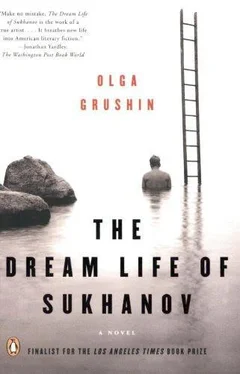And as I finished my cognac, he talked of all the letters he had received from soldiers who had gone through the war carrying in their pockets a torn-out magazine page with some landscape of his that had reminded them of their home village, and all the teary-eyed women who had thanked him for immortalizing their fallen fathers and sons, and how at his age, fifty-six years, a man ought to know whether his life had had a purpose; and somehow Andrei Rublev came up as an artist easily accessible to the masses and mindful of the demands of his time…. The grandfather clock in the next room muttered an inaudible hour. The trapped light swung wildly in my glass as I set it down, and the room, with its gently colored lampshades, gold-lettered spines of books lining the walls, heavy leather chairs, and at its center, the man with Nina’s face pontificating in an arrogant voice, yet with an odd note of uncertainty creeping into his words now and again, swayed briefly, then righted itself, when I stood up.
“I’ve heard enough,” I said brusquely. “I’m going home now.”
Malinin stopped talking, glanced at me with something like alarm. I was walking to the door. “I suppose all this must seem quite sudden,” he said, rising quickly, “especially since you and I haven’t exactly… But all I want now is to help Nina, and after this Manège fiasco… Wait, just take this, will you, leaf through it, sleep on it, discuss it with Nina, and we shall resume our conversation at a more convenient hour, all right?”
Already in the doorway, about to stride out, I looked back at him across the congealing night, and saw, for the first time, the unmistakable traces of aging in his face, the bitter lines pulling at his mouth, the slight trembling in his hands holding out the art book, the restless, almost pleading, look in his eyes…. Unexpectedly I caught the faint echo of something, someone from my distant past, and hesitated, my fingers tightening around the doorknob; then, only dimly aware of my reasons, I came back, ripped the tome out of his grasp, and left without another word. On the threshold of the apartment, it occurred to me that I was forgetting something important. I paused. The entrance hall was crowded with reflections of unkempt, distraught-looking middle-aged men who did not resemble Malinin in the slightest and whom I avoided studying too closely; timid shadows were waiting in the corners, reluctant to enter their nightly dance; trapped between the mirrors, the Polish officer stared into space with stern, and somehow disappointed, eyes; the bowl on the lion-footed table overflowed with an assortment of homeless objects—a cuff link, a black button, a bunch of keys…
And for a second I almost had it, but the memory of the button—just like this one—that Belkin had torn off my coat interfered, dislodging some realization that in another breath would have merited a slap on the forehead and a relieved “Of course!” Shrugging, I pocketed my button’s double so my mother could sew it back on, walked onto the landing, closed the door behind me, and shaking off a strange woman of forty-odd years who was tugging at my sleeve and asking with irksome insistence after some keys (and ignoring a pimpled youth who gawked at me from behind her, saying in an insolent whisper, “Looks like someone’s been dipping into Pyotr Alekseevich’s Courvoisier!”), descended the stairs.
Outside, the city was filled with midnight ghosts, and the December snow was still falling, damp, unrelenting, coming deviously from all directions at once. I walked with rapid steps, peering at every street corner and shuttered storefront through the white whirling. The visit had unsettled me. Without ever considering Malinin’s preposterous proposal, I had been tricked into making a gesture of apparent complicity—tricked by the warm, unsteady haze of inebriation and the pity that had seized me at an inopportune moment, or else by the elusive whiff I had caught of another, long-past encounter—and now I felt soiled, as if I had shared someone’s dirty secret, and anxious, increasingly anxious, to be rid of my compromising burden. The block ended; I crossed a deserted side street at a red light. There were still no trash cans in sight, and the possibility of tossing the book into a snowdrift flashed through my mind, but I hastily buried the thought and continued walking, trying to keep at bay something else that bothered me, something my father-in-law had said, something that almost had a ring of truth to it…. And then, mercifully, there it was, on the other side of Gorky Street, by a building even more grandiose than Malinin‘s—a welcome squat shape, a depository of cigarette butts, ice cream wrappers, and uneasy conscience.
As I ran toward it, I nearly collided with a woman in a full-length fur coat getting out of a magnificent black car parked by the curb. Sidestepping, I automatically raised my eyes, and saw a girl a few years younger than Nina, and rather plain; but what struck me was the expression on her face as she passed me on her way into the building, the folds of her glossy coat flying behind her—a wandering smile, directed at nothing and everything, on her lips, in her eyes. Immediately I despised her—despised her splendid clothes, the Volga at her back, her obvious and oblivious contentment—and hearing the car door slam again, turned with malice, eager to see what crimes of greed, baseness, or indifference branded her husband’s face; for a life like theirs was certain to carry a price. Then, just as quickly, my contempt vanished, supplanted by another, darker feeling. A slightly stooping man of my age, with kindly eyes behind thick glasses, walked by, leading a child by the hand. I glimpsed a tiny heart-shaped face tilted upward and eyelashes instantly furry in the descending snow, and overheard the man say softly, “And so the princess and the mouse went to the tea party at the castle, and there…” The girl was standing in the doorway, waiting for them, smiling. The door swung open, revealing, in one moment before it slammed closed, the marble floor of a columned lobby, bronze lamps, mirrors, the fleeting reflections of silvery high heels, polished leather shoes, a three-year-old creature in a bearlike coat and red mittens, dragging a toy horse by its tail…
Then they were gone, and their chauffeured car slunk away into the night behind my back, leaving the street empty again; but I remained still, abruptly snatched out of my mindless drifting of the past week. My mouth tingled with the burning aftertaste of my father-in-law’s cognac; the snow prickled the back of my neck, my bare hands; in the skies above me floated a few lit windows, behind which families were probably gathered around pastel-tinted lampshades, engaged in some domestic, tranquil pastimes I could not imagine, and countless dark windows, their texture indistinguishable from that of the clouds, behind which other families were no doubt sleeping the dreamless sleep of well-being. And as I stood there, looking up, I understood, for the first time since the Manège disaster, just what my life was bound to become.
There was no hope of my finding stable employment now; I would be forced into driving a night bus at best, sweeping streets more likely. My earnings would be laughable, not enough to cover even a portion of the overpriced canvases and oils I would have to obtain on the black market (for, along with my position, I had lost my access to subsidized art stores); the three of us would go on living until our dying day in this intimate, humiliating closeness, our undergarments drying communally on bathroom pipes; and in a couple of years, when my mother retired, it would be Nina, Nina alone, who would have to bear the weight of supporting us all, of paying for my secret, dangerous calling—paying with long days and longer nights, paying by parting with every small pleasure in which she still indulged on occasion—a ballet seen from the top gallery, a chocolate-covered cherry savored with an evening tea—and paying with something else besides, something she might have wanted more than my art, something we never discussed….
Читать дальше








![Theresa Cheung - The Dream Dictionary from A to Z [Revised edition] - The Ultimate A–Z to Interpret the Secrets of Your Dreams](/books/692092/theresa-cheung-the-dream-dictionary-from-a-to-z-r-thumb.webp)



